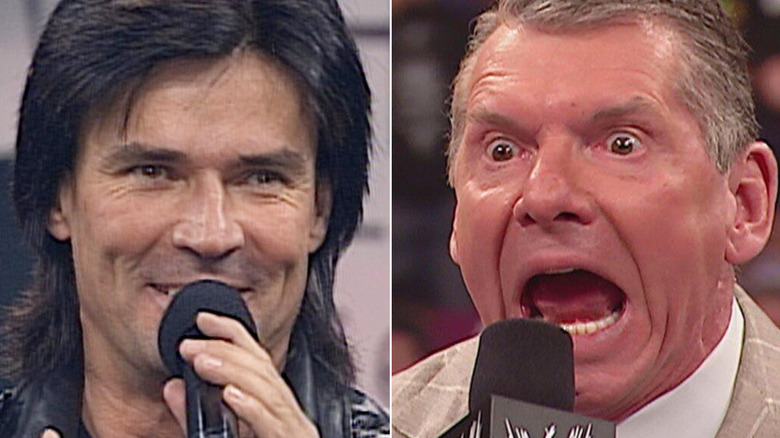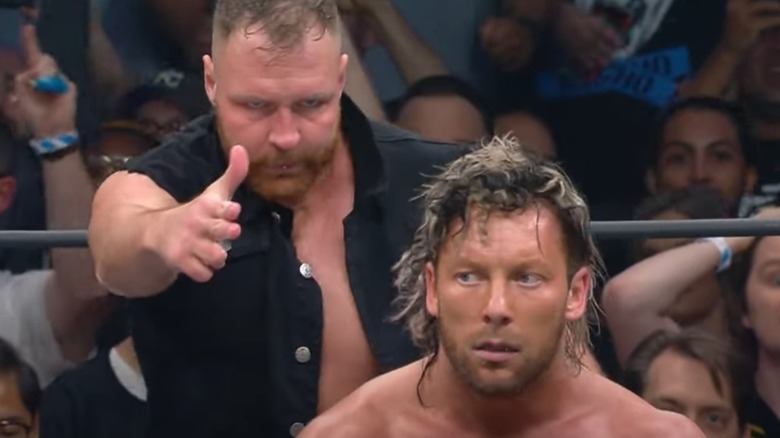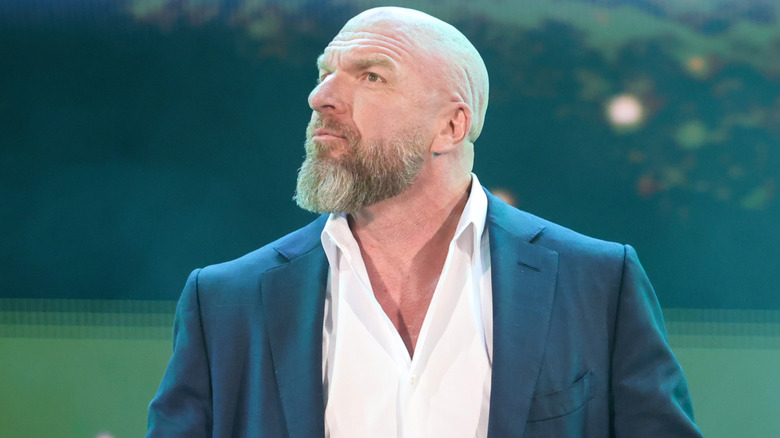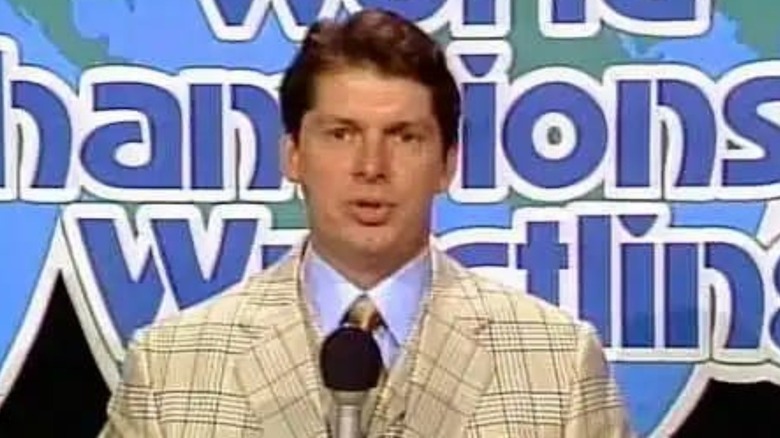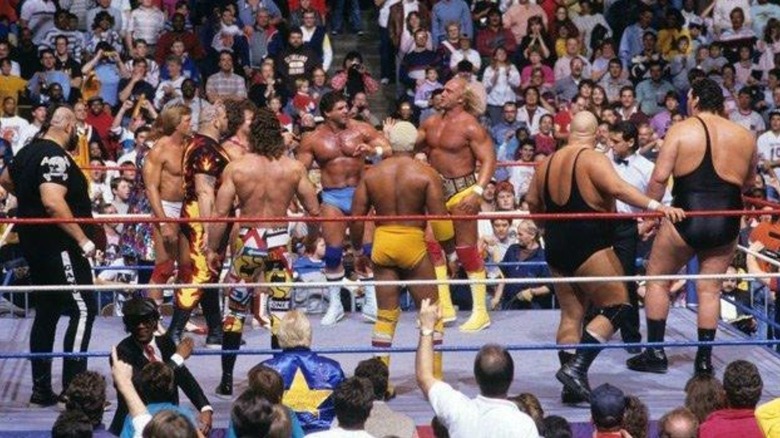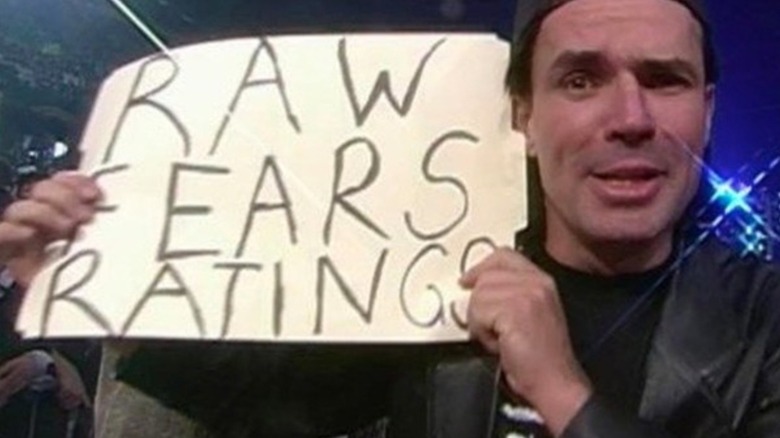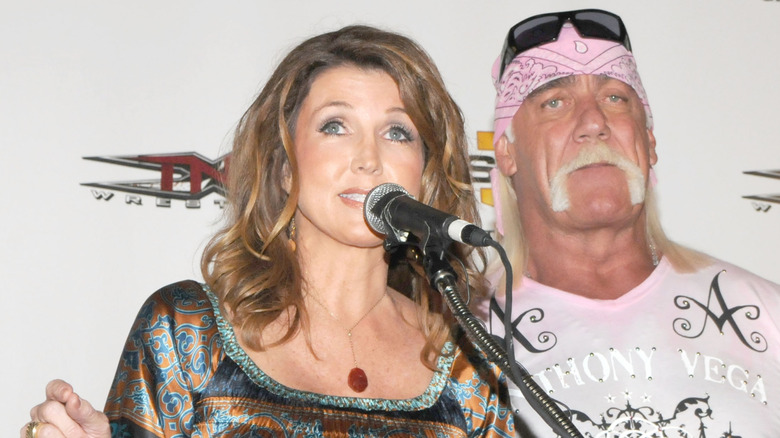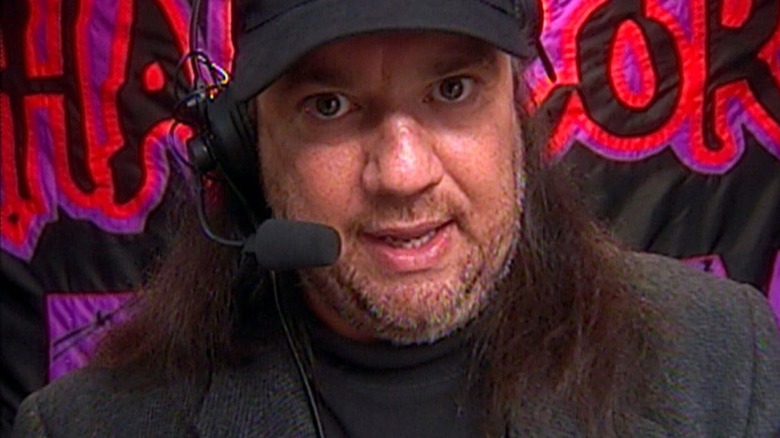The History Of Wrestling's Television Wars
Professional wrestling is one of the most competitive industries on the planet. It's a line of work where everyone is fighting for the top spot in a company so they can earn the most money. However, it's not just the wrestlers who are fighting for people's attention, it's the companies themselves, and the best way to get people's attention is through television.
Since the 1940s, professional wrestling has had its place in the world of TV. In the eyes of the TV executives, wrestling has always been looked at rather favorably as it's incredibly cheap to produce in comparison to sitcoms and dramas, and has such a loyal audience that it's almost guaranteed to draw a decent rating regardless of the time slot.
Over time, wrestling promotions have often valued the importance of television more than anything, with the likes of WWE and AEW making hundreds of millions, and sometimes billions, of dollars in order for media conglomerates to have their TV shows on their networks. But as we've already mentioned, wrestling is competitive, the entertainment industry is even more competitive, and if there's one thing that wrestling companies hate, it's the idea of another wrestling company taking its audience away from them.
This has led to numerous examples of wrestling companies using aggressive tactics to try and bully their opposition into backing down, and if that doesn't work, they aren't afraid to use some underhanded tactics to gain the advantage. That is what we're here to talk about today. So sit back, relax, grab your TV remote and join us on a journey through the history of wrestling's television wars.
WWE vs. AEW on TV
The year is 2019. All Elite Wrestling has been born and already is a thorn in the side of WWE by simply existing.
It only took AEW three shows before WWE started counter-programming, as the company announced that it would be streaming EVOLVE's 10th Anniversary show on the WWE Network at the same time, a decision that received heavy backlash considering AEW's Fight For The Fallen event was a charity show where the money generated at the gate would be donated to an organization set up to support victims of gun violence. Cody Rhodes even rounded out the AEW event by saying that no one can counter-program what AEW was doing. WWE must have been offended by Rhodes' statement as it would then pit NXT UK TakeOver: Cardiff show against AEW's first-ever All Out pay-per-view on August 31.
AEW also landed a TV deal in 2019 that saw its weekly show, "AEW Dynamite" air every Wednesday night on TNT, marking the first time in 18 years that wrestling of any kind had aired on the network. AEW originally filed trademarks for "Tuesday Night Dynamite" but Wednesday ended up being the chosen day. This caught the attention of WWE as it had been airing "WWE NXT" on the WWE Network every Wednesday for seven years and didn't want another wrestling show taking viewers away.
The response was to move "NXT" off of the WWE Network and into a live, prime time slot on the USA Network to go directly against "Dynamite," and just to make sure that WWE got a head start, NXT's premiere on USA took place on September 18, two weeks before "Dynamite's" first episode, to make sure people knew that Wednesday was NXT's night. The Wednesday Night Wars were officially born on October 2, 2019 when "Dynamite" aired its first episode, and outside of a solitary week, "Dynamite" beat "NXT" in the key 18-49 demographic 74 out of a possible 75 times, and in April 2021, "NXT" was moved to Tuesday nights in order to boost viewership.
"Dynamite" and "NXT" have gone head-to-head since then. Every October, "Dynamite" is forced to air on one Tuesday due to the Major League Baseball play-offs, and when this first happened in 2022, AEW's first-ever Title Tuesday episode of "Dynamite" beat "NXT" comfortably. One year later, WWE put the likes of John Cena, Cody Rhodes, and even the Undertaker on the October 10, 2023 episode of "NXT" to get its first victory over AEW in four years. "NXT" won again in 2024, and the 2025 battle will most likely have a number of main roster talents being parachuted in to the Performance Center to give WWE another victory over AEW.
WWE vs. AEW on PPV
Once "WWE NXT" waved the white flag and moved nights, things settled down in the war for attention between WWE and AEW. All of that changed when Vince McMahon was forced to retire. He was replaced by Triple H as the new head of creative, Nick Khan became the new company president, and given that his former pet project had been soundly beaten by AEW, "The Game" wasn't taking any chances a second time around.
Almost immediately, the NXT Worlds Collide event was booked to go head-to-head with AEW All Out on September 4, 2022, with Clash at the Castle taking place the day before. In May 2023, WWE put another two premium live events on Memorial Day weekend to go against AEW Double or Nothing as WWE Night of Champions and NXT Battleground looked to take away the shine from AEW's annual anniversary event.
In 2024 when WWE became more aggressive with its efforts to counter AEW's pay-per-views. King and Queen of the Ring 2024 aired the day before Double or Nothing 2024, Bash In Berlin was WWE's way of preventing fans from mainland Europe making the trip to England for AEW All In London one week earlier, and when AEW announced its final event of the year, Worlds End in Orlando, Florida, WWE announced that it would be hosting a live event on the same day, at the same time, in the same city.
Fast forward to the present day and WWE has almost modeled its entire event calendar around when AEW is holding a pay-per-view. Upon hearing that AEW was holding its annual All In event in Texas on July 12, 2025, WWE decided to host Saturday Night's Main Event on NBC on the same day. AEW countered this by moving All In to an afternoon start time, but WWE responded by announcing that NXT's Great American Bash event would be held at the exact same time. To make sure the focus was on WWE, it also announced the second-ever Evolution event for the day after, but fans have started to grow tired and frustrated about WWE focusing more on AEW and less on itself.
Did WWE listen to these calls? No. In fact it ended up doubling down by running a UK tour over the same period as AEW's Forbidden Door pay-per-view on August 24 in London, England, before booking the NXT Heatwave PLE to air on the same day. Since then, WWE announced that its new Wrestlepalooza PLE will air on September 20 on the new ESPN DTC service, making it the first main roster PLE to go head-to-head with AEW, which had already announced its All Out pay-per-view for that date weeks earlier. WWE isn't going to stop until AEW goes out of business, so expect more of this counter-programming for years to come.
Black Saturday
One of the most infamous wrestling moments of all time, July 14, 1984 the night that Vince McMahon of the World Wrestling Federation showed up on WTBS' "World Championship Wrestling," Black Saturday.
This wasn't necessarily an example of counter-programming, but it was an example of the then WWF wanting to have a monopoly over the cable television market. Georgia Championship Wrestling had aired on WTBS every Saturday evening for 12 years, and "World Championship Wrestling" (not to be confused with the company of the same name that was born a few years later) was a huge success. McMahon wanted his promotion to be the only one on cable and approached Ted Turner about purchasing the Saturday timeslot. Turner immediately refused, causing McMahon to take a different approach. Capitalizing on the backstage animosity between the GCW owners, McMahon bought the stakes of Jack and Gerald Brisco, as well as Jim Barnett, to give him a controlling stake in GCW, leaving Turner no choice but to allow McMahon's WWF program on to his network.
Almost as soon as the first episode of "World Championship Wrestling" under the WWF umbrella went off the air, there was outrage. Loyal GCW fans weren't happy with the style of wrestling McMahon promoted and sent thousands of letters to the network to bring back its old program. Turner would even bring other wrestling shows to his network, with Mid-South Wrestling airing on Sunday mornings, and Championship Wrestling from Georgia (the spiritual successor to GCW) on Saturday mornings, to try to force McMahon's hand, who was not only being beaten in the ratings by the other shows, but was losing money by the week.
This run for WWF would only last until March 1985 when Jim Crockett Jr. purchased the time slot from McMahon for $1 million, and the final WWF show on WTBS aired on March 30, 1985, the night before the first WrestleMania, which was now partly funded by Crockett himself. As for Turner, he would purchase Championship Wrestling from Georgia from Crockett, rebrand the company as WCW in 1988, and would eventually withdraw the company from the NWA in order for it to be seen on a national level, much like the WWF.
The Reason Survivor Series Was Created
Clearly harboring some resentment towards Ted Turner, the NWA, and basically anyone in the state of Georgia, McMahon looked for other ways to mess with his biggest competition, and one year before WCW was officially born, McMahon attempted to kill the NWA's biggest event of the year.
Before WrestleMania, there was Starrcade, NWA's annual supershow where the biggest storylines in the promotion would culminate on Thanksgiving weekend. From the show's inception in 1983 through to 1986, Starrcade only aired on closed-circuit television, but the show's size had grown to the point where in 1987, Starrcade was going to air both on closed-circuit TV and on pay-per-view for the very first time. However, Vince McMahon had already brought wrestling to pay-per-view with the first three WrestleMania's, and wasn't going to have another promotion taking money out of his pocket.
To combat Starrcade, McMahon created Survivor Series, a brand new pay-per-view that would air on the same night, and at the same time as Starrcade. To make matters even worse for Jim Crockett and the NWA, McMahon had even threatened the pay-per-view providers that if they carried Starrcade, he wouldn't allow them access to WrestleMania 4 the following year. Not wanting to lose out on an event that had now become a guaranteed money maker for them, the majority of providers dropped Starrcade from their schedule and only carried Survivor Series instead. Survivor Series earned almost double the amount of buys that Starrcade did thanks to more providers carrying the event, and after Turner bought the company in 1988, Starrcade would be moved from Thanksgiving to the final weekend of the year.
The Monday Night Wars
A journey through the history of wrestling wars on TV wouldn't be complete without the most famous example of all; the Monday Night Wars. After all, the head-to-head battle between "WWE NXT" and "AEW Dynamite" took its name from the iconic six year fight for dominance between "WWE Raw" and "WCW Monday Nitro."
In 1995, WCW Executive Vice-President Eric Bischoff was asked by Ted Turner how WCW could compete with WWE. Bischoff said that the company needed a show on prime time TV every week, and much to the surprise of Bischoff, Turner gave him a one hour timeslot on Monday nights to go directly against "Raw" which aired on the USA Network.
On September 4, 1995, "Monday Nitro" aired on TNT for the first time, and while fans might not have known it at the time, this would be the beginning of arguably the biggest boom period wrestling had ever seen outside of potentially the peak of "Hulkamania." WWE was in a bad spot at this time, and was dangerously close to going out of business entirely due to losing money, the aftermath of the Vince's steroid trial, and the fact that there was another company on TV that seemed to have bottomless pockets of cash to throw around.
The two shows would trade ratings victories until June 1996 when the debut of Scott Hall and Kevin Nash caused "Nitro" to be unmissable, and with Hulk Hogan joining them to form the New World Order shortly after, "Nitro" went on its now legendary 83-week run atop of the wrestling world, beating "Raw" in the ratings every single week. However, WWE knuckled down and focused on building itself back up, and through the feud between Vince McMahon and Steve Austin, the popularity of D-Generation X, and the rise of stars like the Rock, WWE would fight its way back into the war, winning its first ratings battle in nearly two years in April 1998.
From there, it was all downhill for WCW. It would get its final victory of the war on October 26, 1998, the night after the infamous Halloween Havoc pay-per-view where the feed was cut due to running too long, and WWE established its dominance. McMahon's company became the biggest it had ever been, and after WCW had circled the drain, McMahon purchased his biggest rival in March 2001, a move that was aided by the AOL Time Warner merger in 2000, and the new head of Turner Broadcasting, Jamie Kellner, cancelling all wrestling on Turner networks. WWE had won the war.
The Monday Night Wars 2.0
Nine years on from the death of WCW, WWE ended up in another war with a promotion that had Hulk Hogan and Eric Bischoff at the forefront.
Throughout the 2000s, TNA Wrestling had emerged from the ashes of WCW as a major independent promotion. Over time, TNA would go from airing weekly on pay-per-view, to having various brief stints on TV, to getting monthly pay-per-view distribution and eventually a major TV deal with Spike TV, the network formerly known as TNN which aired "WWE Raw" from 2000 to 2005. By the end of the decade, TNA had become the second biggest wrestling company in the United States, but wanted to be competitive with WWE as that company was struggling to keep a consistent audience after reverting back to a PG rating for the first time since the mid-1990s.
With the help of Hogan and Bischoff, TNA's weekly show, "Impact," aired a special three-hour broadcast on January 4, 2010, that went head-to-head with "Raw." The show was seen as one of the biggest nights in TNA history, and not taking any chances, WWE's answer to this show was to have Bret Hart make his WWE return for the first time since the Montreal Screwjob to bury the hatchet with Shawn Michaels. "Raw" comfortably beat "Impact" in the ratings, but TNA earned its biggest rating ever, which gave Spike TV executives enough confidence to move "Impact" to Monday nights from March onwards.
In the history of wrestling, there might not be a more ill-advised decision than TNA moving to Monday nights permanently. The move was made during the build-up to WrestleMania 26 which didn't help matters, and "Impact" would hemorrhage viewers as the weeks went on. The 2010 version of the Monday Night Wars lasted a grand total of two months before "Impact" returned to Thursday nights on May 13, where it would stay until 2014 when Spike TV didn't renew its deal, sending TNA into a dark age throughout the 2010s that almost killed the entire company.
ECW vs. TNN
It's one thing to have two companies on two networks fighting it out for ratings superiority, it's another thing to have one company on one network and that company's biggest enemy be the network itself. Despite being on the verge of bankruptcy seemingly since the day it was founded, Extreme Championship Wrestling looked to have found the answer to all its problems when Paul Heyman announced that ECW would be airing on TNN (which would eventually become Spike TV) every Friday night beginning in August 1999. However, this deal would effectively be the albatross that dragged ECW underwater.
From the moment the deal was struck there were problems. TNN wanted to change the look of ECW in order to make it more TV friendly, something Heyman wasn't prepared to do, causing TNN to not promote ECW's show under any circumstances. The original pilot that ECW had put together didn't satisfy the network, so Heyman put together a compilation episode to be the "ECW on TNN" pilot instead, which TNN naturally hated. Former ECW producer Ron Buffone stated on "The Rise and Fall of ECW" documentary that TNN wanted ECW to look more like WWE and WCW despite only having a fraction of the budget, and within just a few weeks of ECW airing its first episode, both Taz and the Dudley Boyz — two acts TNN wanted to profile as major stars — signed with WWE.
Speaking of WWE, TNN would enter into negotiations with Vince McMahon in 2000 about acquiring "WWE Raw" while "ECW on TNN" was still airing. Heyman believed that ECW was the test subject to see if wrestling would work on TNN, which given that there would be wrestling on the network until 2014 meant that it certainly did, and in September 2000, "Raw" premiered on TNN, with ECW being cancelled two weeks later. ECW's efforts to find another network proved futile, and the company held its final show on January 13, 2001, before officially filing for bankruptcy.
